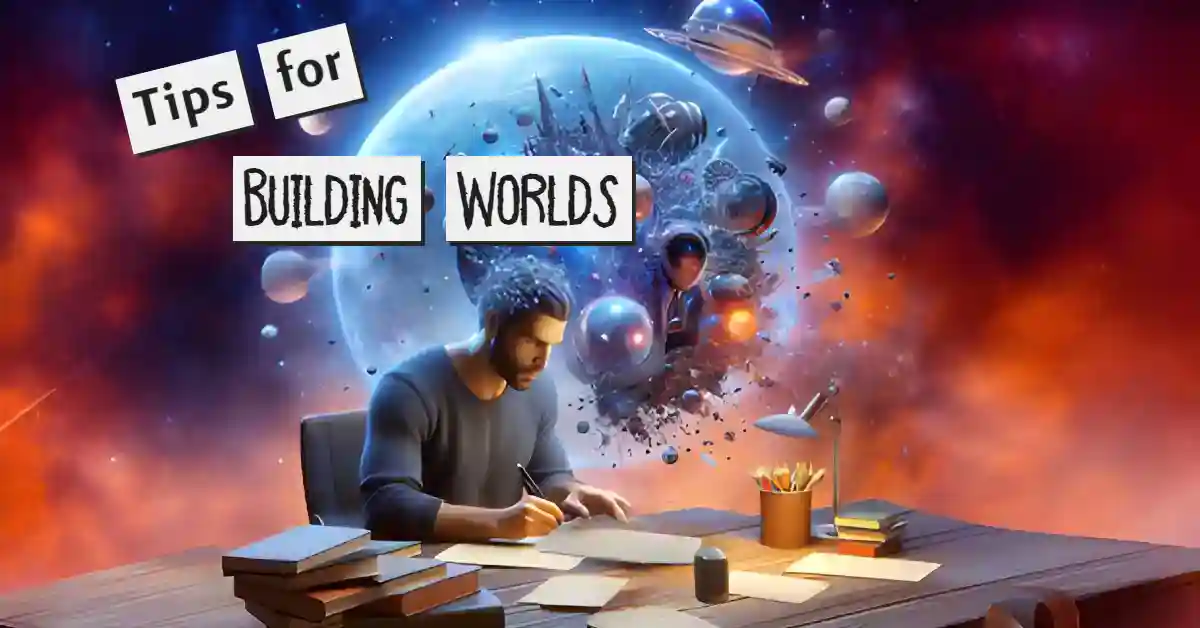Worldbuilding can be the most liberating piece of telling stories in speculative fiction, particularly in sci-fi and fantasy. Being unbeholden to the limits of our world allows your characters to have an entirely different set of environmental, cosmic, and cultural settings. It’s an opportunity for you, as the writer, to bend a world to the needs of your story, and to enthrall the imagination of your reader while doing so.
It’s also one of the elements that tends to trip up speculative fiction writers. Those of us in the sci-fi and fantasy camp tend to overindulge in our worldbuilding. We get so caught up in the minutia of creating a fantastical setting, we lose sight of our story. Conversely, other writers might struggle to form a comprehensive world in the first few chapters, one that feels as tangible as our own. Here are a few tips that may help you construct a world that serves your story.
Get physical
In her Masterclass, N. K. Jemisin recommends building your world from the ground up, literally. Pull out a piece of scrap paper. If your story takes place on a planet, pick up a pencil and draw a sphere. If it takes place on an international space station, consider drawing that, or sketching out the solar system your station inhabits. Decide if your planet is going to have an equator. How about oceans? If so, draw out the continents. Next, take a deeper dive into earth science. What is the climate like where your story takes place? Are there seismic influences? How many suns and moons? What is the ecology of the place where your character lives?

Once you’ve got a good idea of the geophysical aspects of your world, you can start to build out the culture. We are products of our environment, so the characters of your story will be uniquely defined by the world that has raised them. For example, think about the Fremen in Dune, the Orogenes in Fifth Season, the Wildlings in Game of Thrones. How have these cultures been shaped by their environment? What clothes do they wear, what gods do they worship, what customs do they have, what curse words do they use?
If you’re writing a story that takes place in our world, what tweaks do you need to serve the story? Is there a secret class of people who can wield magic but don’t want the muggles to know? Have they created unique ways to enter their magical world, perhaps through a platform accessed behind a brick wall? Flesh out how the speculative aspects of your story have altered planet Earth as we know it.
Real world glimmers
The variety and history of humanity on our own planet is a rich source of inspiration. The bonus is it’ll automatically be more relatable to your reader. For example, I recently travelled to the Yucatan peninsula in Mexico. I was struck by the fact that there are no overground rivers on the entire peninsula. All the rivers flow underground. I visited some Mayan ruins and learned how this ancient civilization adapted to the underground rivers. What a fascinating source of inspiration.
These moments are called “glimmers”, experiences that spark your imagination. Could I write a story about a group of people that live on a planet without any above ground rivers? What would their cave systems look like? How would that impact their civilization? What tasks would exist? Be careful to make sure you don’t appropriate another culture entirely but find pieces of inspiration and build from there.
As you go through life, keep a running list of these glimmers. Fascinated by the honor-bound nature of Samurai in ancient Japan? Write down “strict honor code.” Does something in modern-day politics evoke a strong emotion? Dig to the root of what is causing the emotion and write it down. You never know when these snippets of real-world circumstances can inspire an element in your worldbuilding.
Less is more
How much worldbuilding does our reader need? Do they need to know every detail that we’ve hashed out over long hours poured into research and the entire history of civilization we’ve constructed? The answer is emphatically, No.
One of the classic downfalls of writers in the speculative genres is our desire for the readers to know how much effort we’ve put into building our world. But remember, we’re trying to write a story here, not a textbook on the history of Middle Earth. Let your world fold naturally into your story. As your character goes about their journey, they will encounter their world, and the reader will ease into it until it’s as real to them as our own. Give us the pieces that are relevant to your characters and let the rest fall to the background.
The good news is you don’t have to know every single detail of your world either. In Brandon Sanderson’s course at BYU (available on YouTube for free), he talks about the tip of the iceberg. As the writer, you should know more about your world than the reader, but it doesn’t mean you have to know everything, only what your reader sees above the waterline. Let your world serve your story, not the other way around.
Bring us home
For a reader to feel at home in their new world, we’re going to need to understand its limits. Every world has boundaries, customs and norms. I’ll give you a cheat code: your reader will automatically assume some aspects of your story from genre tropes or reflections on our own world—unless you specify otherwise.

You can use this to your advantage. Pick and choose the most important differences to highlight how your world is unique. For example, because we live in a patriarchal society, most people will assume that your world is patriarchal unless specified otherwise. Thus, you don’t have to delineate the power dynamics between genders unless your world has a different societal structure. Similarly, we’ll assume human characters are breathing oxygen unless you describe the mechanisms worn over their mouths to filter out the toxic gases on their planet.
If you struggle with worldbuilding, I suggest pressing forward and letting the story elements of the world unfold organically. You’ll be amazed with what you come up with! If you’ve spent months on a deep dive into your worldbuilding, consider pruning down to the elements most relevant to your characters and focusing on those for now. Either way, have fun, get creative, and happy writing.

K.A. Clyatt is a rancher, textile artist, and writer who grew up on the slopes of a mystical volcano and now lives in Montana. She joined SFWA in Summer of 2024 and is currently working on two separate fantasy series.

